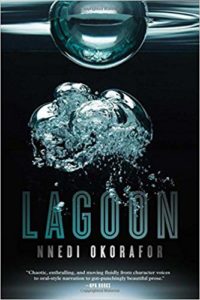 This charming, magical-fantasy set in Lagos, Nigeria, is full of colorful, visually arresting scenes that would look great on a screen. In present-day Lagos, aliens land in the lagoon next to the city. Three people are sucked into the sea as the ship sinks. This “ship” seems to be a giant, purple octopus, but it’s hard to tell.
This charming, magical-fantasy set in Lagos, Nigeria, is full of colorful, visually arresting scenes that would look great on a screen. In present-day Lagos, aliens land in the lagoon next to the city. Three people are sucked into the sea as the ship sinks. This “ship” seems to be a giant, purple octopus, but it’s hard to tell.
Soon after, the humans emerge from the sea unharmed, with only vague memories. They go about their daily business as if nothing had happened. Plausible? No. Interesting? Yes.
And that’s the pattern of this novel. It is a set of loosely connected scenes that paints an idiosyncratic portrait of life in Lagos, but those scenes do not add up to a novel in the traditional sense. We never learn where the aliens are from or why they came. As shape-shifters, they look like anything you want, from an ordinary woman to a dolphin. The aliens come in peace, they say, and claim to represent “change,” which is not defined, but looking back over the whole novel, I think that is the driver.
This is a story about how life in Lagos is upended by changes wrought by technology, communication, transportation, immigration, science, population density, social and economic inequality, gender identification, pollution, and much else: all the maddening, head-spinning changes that afflict recent modern life everywhere, but which are especially confusing in ultra-conservative, deeply traditional Africa.
How can society adjust to such a pace? It can’t. The only hope of adapting to modern life would be if aliens landed from outer space and promised to make everything right. That’s what the book is about. It is nostalgic for the simpler, traditional past, but it’s also realistic about progress and the harsh present, the poverty, corruption, ignorance, and superstition that block improvement. So the aliens represent the only hope for a better future.
The author’s extensive use of pidgin-English lends an air of authenticity to the human characters but is virtually impossible to read, so much of the dialog can only be skimmed. It seems to be mere chit-chat anyway. None of the characters shows a well-developed interiority that a reader can identify with. Instead, bizarre things happen and everybody scrambles in reaction.
I favor novels of psychological discovery. I believe that is the unique artistic opportunity that the novel form offers. This novel, a collection of dozens and dozens of almost unconnected scenes with no solid story through-line, doesn’t do it for me.
Is it psi-fi? It could have been. Human psychological reaction to changing times is a deep and complex topic, and using aliens as a foil for that exploration is a neat device. However, the thesis wasn’t developed enough to satisfy me, so it’s not psi-fi. Actually, the novel is only marginally sci-fi. It is really a magical-realist fantasy set in Nigeria with a light sci-fi touch.
On the plus side, I got a peek into physical, economic, and psychological life in modern Lagos, and that, along with the author’s relentless imagination, redeems the novel.
Okorafor, NNnedi (2004). Lagoon. New York: Saga Press, an imprint of Simon & Schuster, 304 pp.